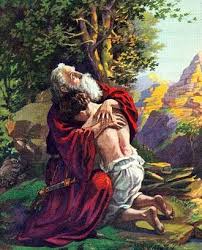The details and implications of God’s covenant with Abraham are far-reaching. Three distinct, yet related, promises are at the heart of this covenantal gift of grace: one seed, one land, and one universal blessing. Each of these finds its ultimate meaning in the Lord Jesus Christ. It is not surprising that Jesus declared that Abraham rejoiced to see His day (John 8:56).
The promise of a seed is the central point of God’s promise to Abraham, just as it was in the promise made to Adam and Eve and as it would be made, years later, to David. The promise of a righteous seed is the thread that connects every covenant promise. It is true that identifying the seed can be complicated because it sometimes refers to several people and sometimes to just one. First, Abraham’s seed was physical. God promised that Abraham would be the father of many nations (Gen. 17:5). There were nations that arose from his offspring with Hagar and Keturah, but the seed of promise was Isaac, the son of Sarah. From Isaac came Jacob and then the nation of Israel. The development of this physical seed was essential to the coming of Christ, because He was in the lineage of Abraham. It was from Israel that Christ came “according to the flesh” (Rom. 9:4-5). There had to be a physical seed if there was to be a Christ of God. Thus Israel, the physical and particular seed of Abraham, was the means for the messianic fulfillment of God’s promise.
The lineage of Abraham was chosen for the physical identity of the Messiah, but all nations of the earth benefit from the Messiah.
Second, the seed was and is spiritual. God’s promise of a seed more numerous than the stars in the sky or the sand on the seashore goes beyond Abraham’s physical descendants. Jesus made it clear that it was possible to be a physical descendant of Abraham without being a spiritual descendant (John 8:39). Similarly, Paul said that not all Israel is Israel (Rom 9:6-8). The true children of Abraham are those who have faith (Gal 3:7). Nationality is irrelevant: to belong to Christ is to be Abraham’s true offspring and heirs of the promise (Gal 3:29).
Third, and most importantly, the ultimate or ideal seed is Christ Himself. Although the word translated “offspring” or “seed” can refer to multiple persons as well as to one individual, the form is grammatically singular. Paul focuses on that grammar when he gives his inspired, messianic interpretation of the Abrahamic promise: “He does not say, ‘And offspring,’ as meaning many; but rather, ‘And your offspring,’ that is, Christ,’” ( Gal 3:16 ). For good reason, the New Testament begins by identifying Jesus as both the son of David and the son of Abraham ( Mt 1:1).
The promise of the land was also a key component in the Abrahamic promise. It is both physical and spiritual. The land referred to an actual geographic territory. However, the land conveyed a spiritual message beyond geography and borders. It was a perfect symbol or example of the delight of rest in the presence of God and in communion with Him. It is this symbolic sense that points to Jesus as the giver of spiritual rest that reconciles us to God ( Mt 11:28 ; Col 1:22 ). Just as there was an Old Testament “Jesus” (Joshua) to bring about physical rest on the land (Heb 4 ), so there is the ideal Jesus who leads His people of all ages and places into the promised rest. Even the “dust” of the promised land pointed to the prospect of spiritual rest possible only through the ideal seed of Abraham. The language of our text that the seed “shall possess the gate of their enemies” simply means that the defenses of the enemies cannot oppose the advance of the seed. In New Testament language, Christ said that He will build His church and that not even the gates of hell will be able to prevail against the advance of the seed.
That God blessed Abraham, and made his seed a blessing to the whole world, focuses the attention of the promise squarely on Christ. The only thing about Abraham’s descendants that can in any way be interpreted as a blessing to the whole world is Jesus, the ultimate seed of the promise. Paul gave an inspired interpretation of this Abrahamic blessing when he said that Christ became a curse by hanging on the tree so that “in Christ Jesus the blessing of Abraham might come to the Gentiles” (Gal 3:13–14). This highlights a key messianic theme throughout the Old Testament: the promise of the Messiah was never an exclusively Jewish promise. The only claim that Abraham’s physical seed had on Christ was that He came into the world physically through them (Rom 9:4–5). Abraham’s lineage was chosen for the physical identity of the Messiah, but all the nations of the earth benefit from the Messiah. The Abrahamic covenant gives us a better understanding of the identity of the promised Seed while at the same time maintaining the inclusive nature of God’s gracious purpose for “all the families of the earth” (Gen 12:1-3).
